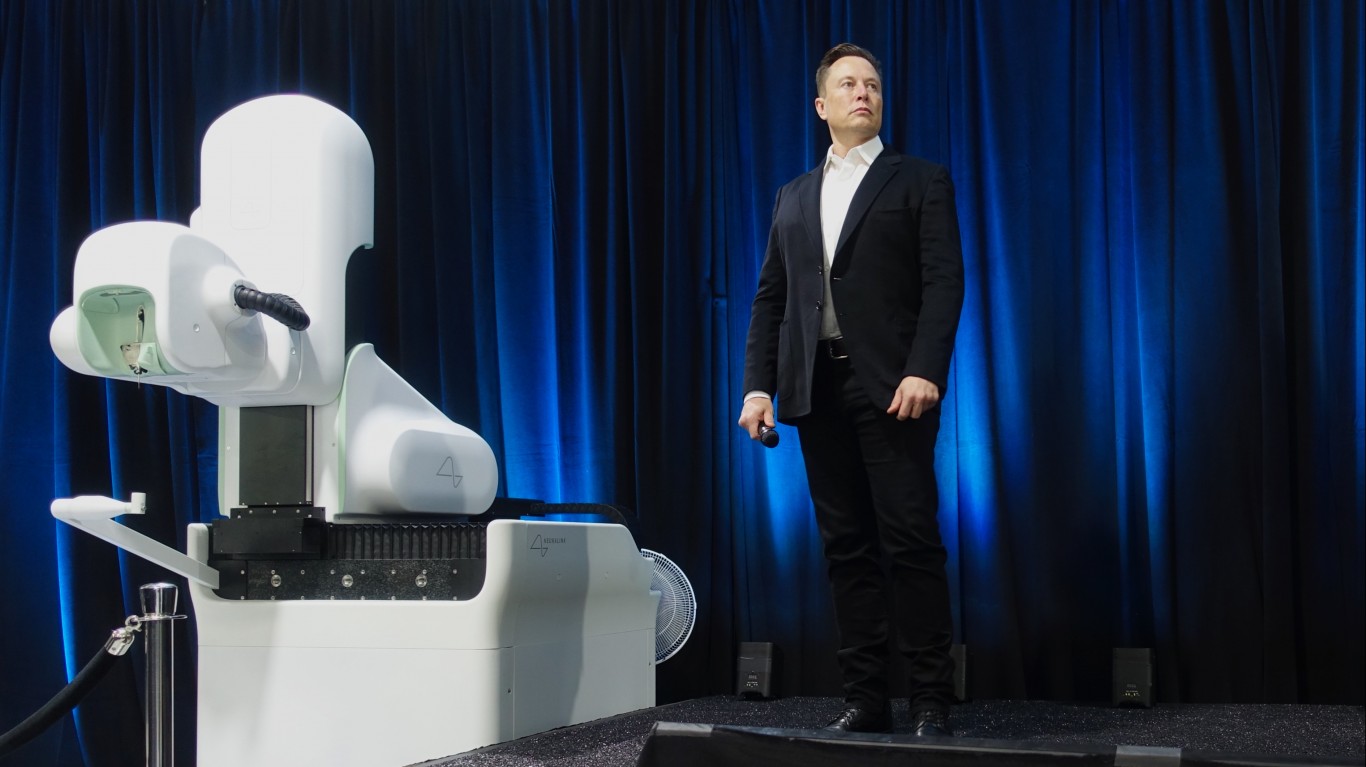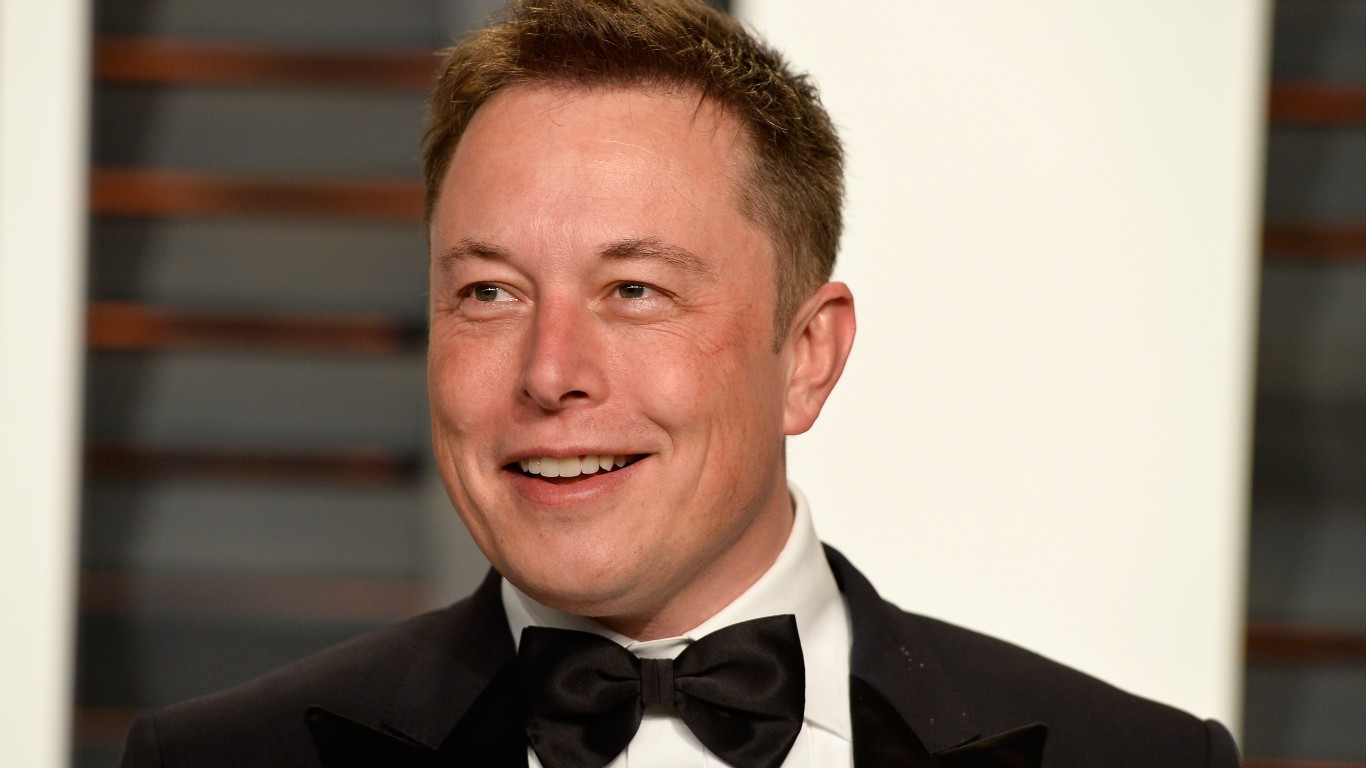
April’s news headlines were dominated by the war in Ukraine, inflation – and Elon Musk’s bid to buy Twitter. The saga ended Monday, when Twitter accepted Musk’s buyout bid in a deal worth about $44 billion, with Musk acquiring the rest of Twitter’s stock that he doesn’t already own for $54.20 a share.
The Tesla and SpaceX CEO – and the world’s richest person – has already disrupted the automotive, transportation, and aerospace industries. He has a footprint in health care, AI, infrastructure, energy, and telecommunications. And now he has set his sights on social networking. Perhaps it is no wonder he is projected to be the world’s first trillionaire. (These are the richest Americans of all time.)
To determine the companies Musk is or has been involved in, 24/7 Wall St. reviewed regulatory filings, media reports, online encyclopedias, and other knowledge bases. Companies are listed alphabetically.
By far, Tesla and SpaceX are Musk’s largest companies, worth a trillion and $100 billion, respectively. Twitter will be the third, right now worth nearly $40 billion. To buy Twitter, Musk has created three companies: X Holdings I, X Holdings II, X Holdings III. He may want to shuffle his enterprises under these umbrellas. (Tesla models are among the 25 best-selling American cars.)
Click here to see all Elon Musk’s companies
In addition to the companies listed, Musk has also invested in the now Google-owned AI company DeepMind and neurotechnology company NeuroVigil, and has been involved in cryptocurrency, affecting the price of dogecoin and other altcoins with his tweets. In general, his reach and influence on Twitter – where he has more than 85 million followers – is huge. His influence outside of Twitter is by no means small either.
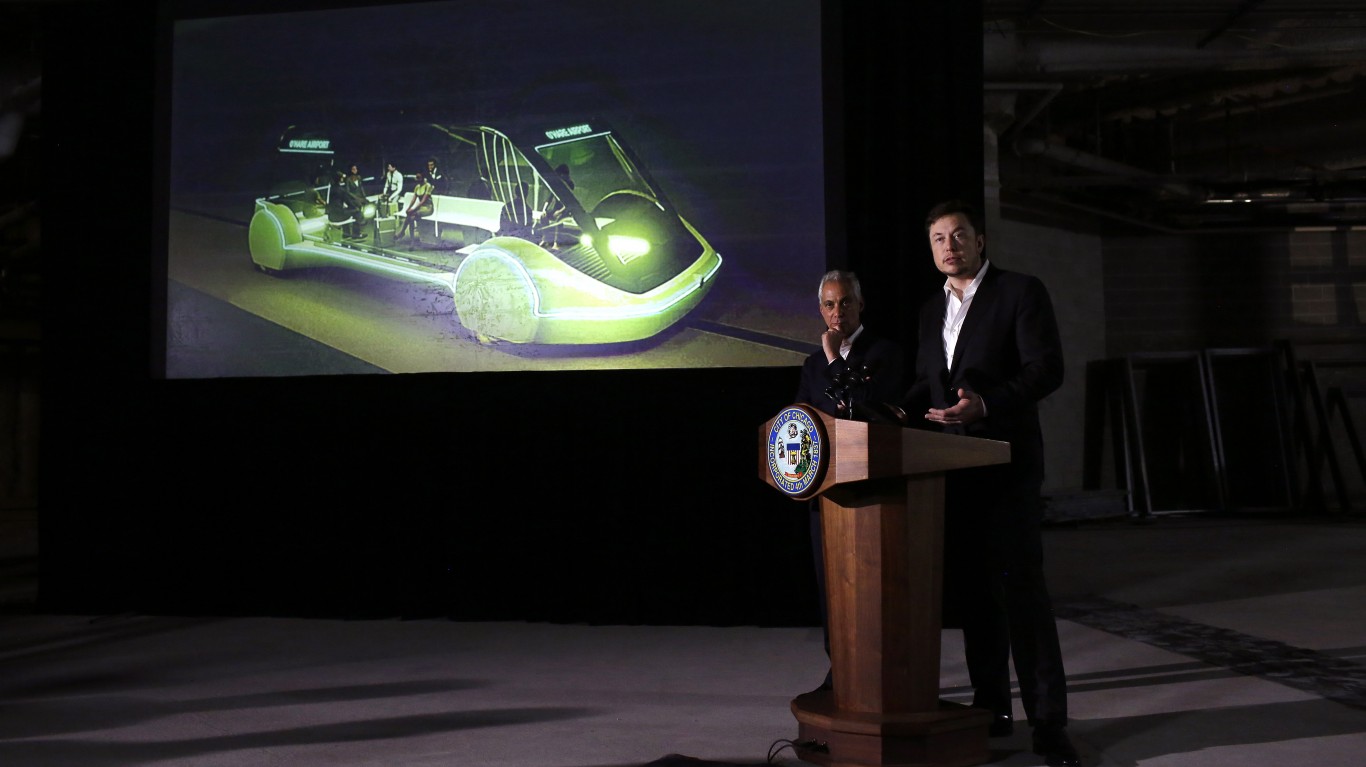
The Boring Company
> Valuation: $5.675 billion
> Employees: 195 (Craft Co. estimate) with dozens of openings
Musk founded the Boring Company, an infrastructure and tunnel construction company, in 2016 with a mission: “To solve the problem of soul-destroying traffic, roads must go 3D.” TBC has completed several tunnels with others in various stages of construction, discussion, and planning. The company’s recently completed third funding round of $675 million valued TBC at $5.675 billion.
[in-text-ad]
Neuralink
> Total funding: $363 million
> Employees: 217 (Pitchbook estimate) with dozens of openings
Musk co-founded this health tech venture with “a dream team” of eight scientists, per Fortune. Neuralink is developing implantable brain machine interfaces for a wide range of applications, including helping people with brain-related injuries and paralysis, according to the company. Neuralink has completed several rounds of financing, the most recent one of $205 million.
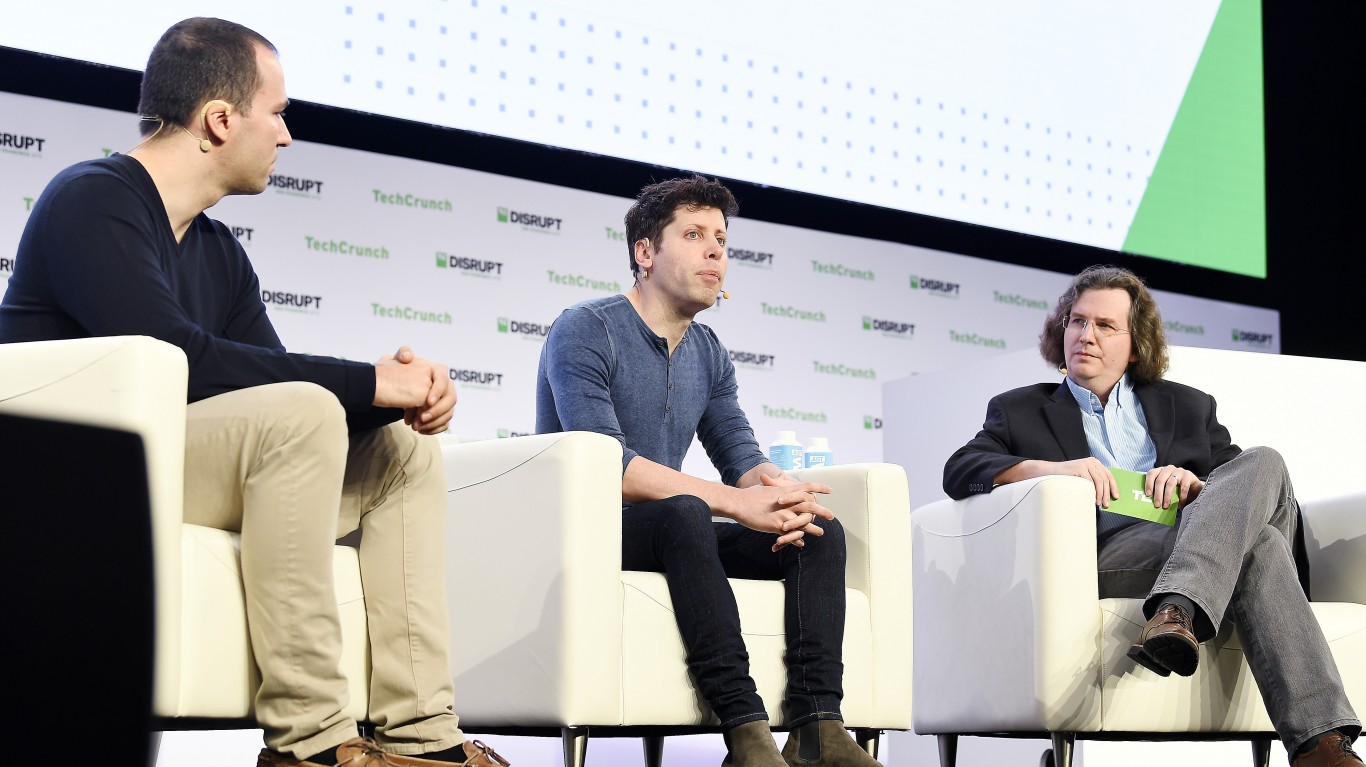
OpenAI
> Funding: $1 billion pledge (matched by Microsoft)
> Employees: 263 (Growjo estimate)
Artificial Intelligence company OpenAI was co-founded by Musk in 2015 as a nonprofit with the aim of creating artificial intelligence safely and in a way that benefits all of humanity. The company transitioned to for-profit, specifically capped-profit, in 2019, a year after co-founder Musk resigned the board due to potential future conflict of interest with Tesla’s development of the self-driving AI. He remained a donor and advisor, however. Microsoft invested $1 billion in 2019.
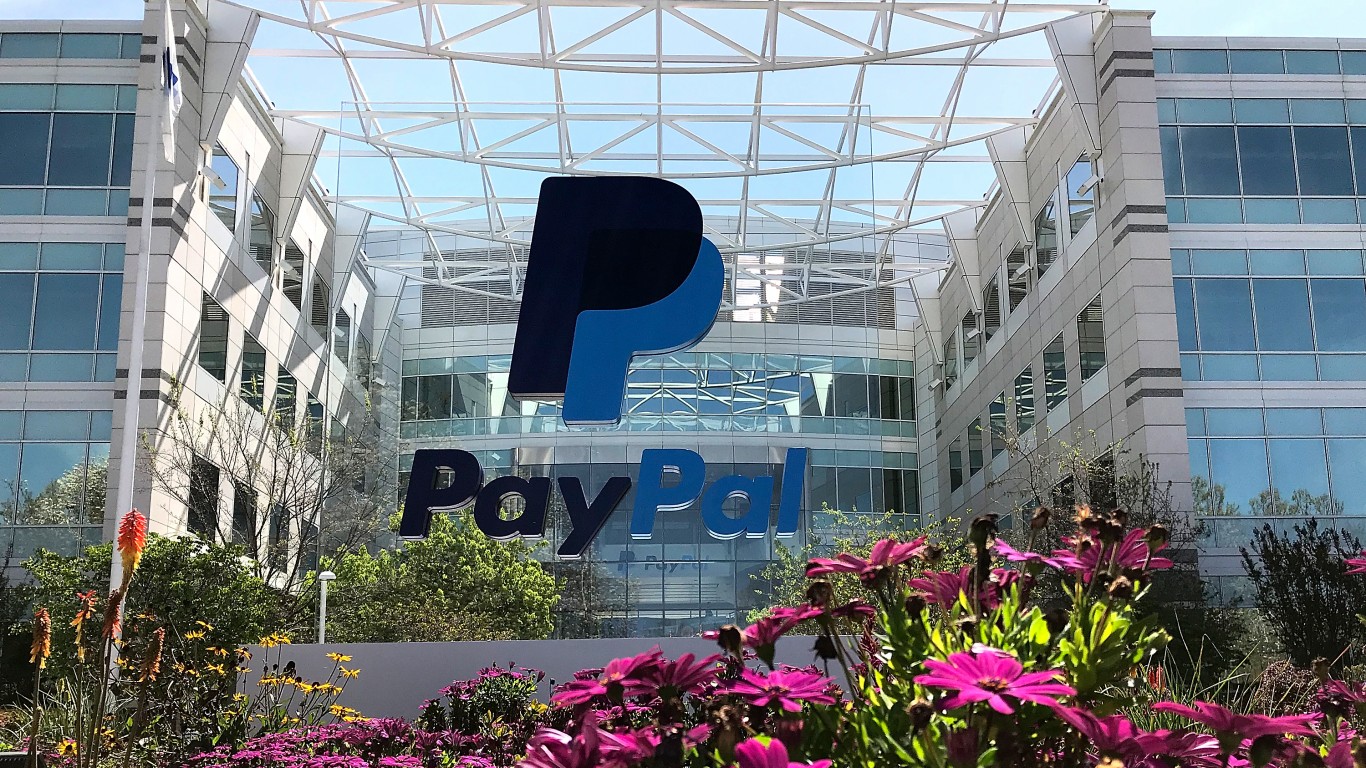
PayPal (through X.com)
> 2021 revenue: $25.4 billion
> 2021 profits: $4.2 billion
> Market cap: $106.4 billion (April 22)
> Employees: 26,500 (2020)
Musk co-founded his second startup, X.com, in 1999. The online financial services company merged with competitor Confinity Inc. a year later. The merged company changed its name to PayPal and went public in 2002. That year, eBay bought PayPal for $1.5 billion. At the time, Musk owned over 11% of the shares.
PayPal was spun off to become an independent company in 2014, but long before that, Musk sold his stake and used the proceeds to start SpaceX and Tesla among others. Perhaps anticipating a need (see X Holdings) Musk bought the defunct domain name X.com from PayPal for an undisclosed amount in 2017.
[in-text-ad-2]
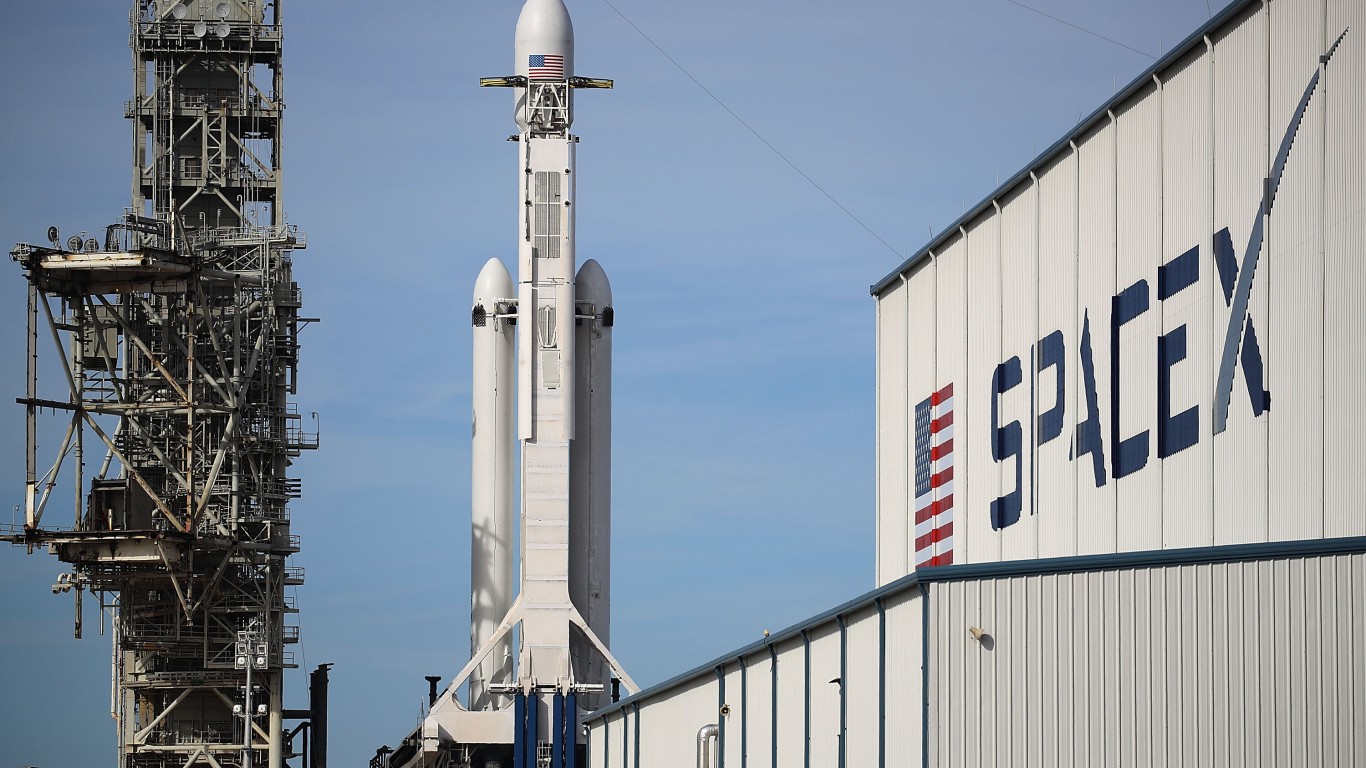
SpaceX
> Valuation: $100 billion
> Funding: $1.5 billion in 2021
> Employees: 12,000 (according to a Musk interview)
Musk founded Space Exploration Technologies Corp. (doing business as SpaceX) in 2002, using $100 million from his PayPal payout, with the goal of revolutionizing space transportation technologies and colonizing other planets. Since its founding, SpaceX has launched 153 rockets carrying satellites or spacecraft into orbit, including a recent one with an all-civilian crew. It is a leading provider of launch services, including for NASA. SpaceX is privately owned, but through rounds of fundings – amounting to $1.5 billion in total in 2021 – it is valued at $100.3 billion, according to CNBC.
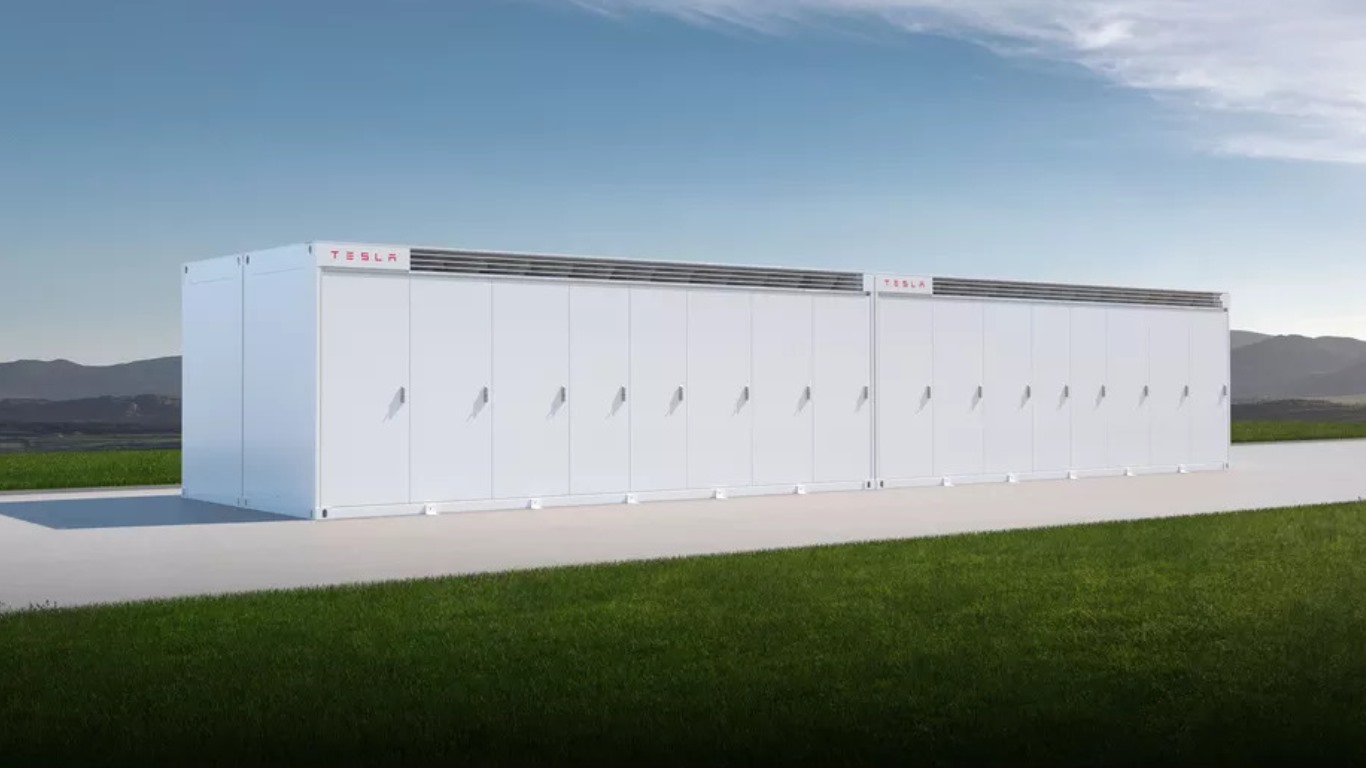
SolarCity (now Tesla Energy)
> 2021 revenue: $2.8 billion
> 2021 loss: $129 million
SolarCity was founded in 2006 by Musk’s cousins, Peter and Lyndon Rive, with the backing of Musk. It was a publicly traded company until Tesla acquired it in 2016 in a deal worth about $2.6 billion and reorganized it into Tesla’s energy generation and storage provider. The business has not taken off in the same way as Tesla’s automotive segment, though 2021 could have been a turning point. Several large projects and growing popularity of other products have contributed to significant revenue growth in 2021. Still, the segment reported a loss that year.
[in-text-ad]
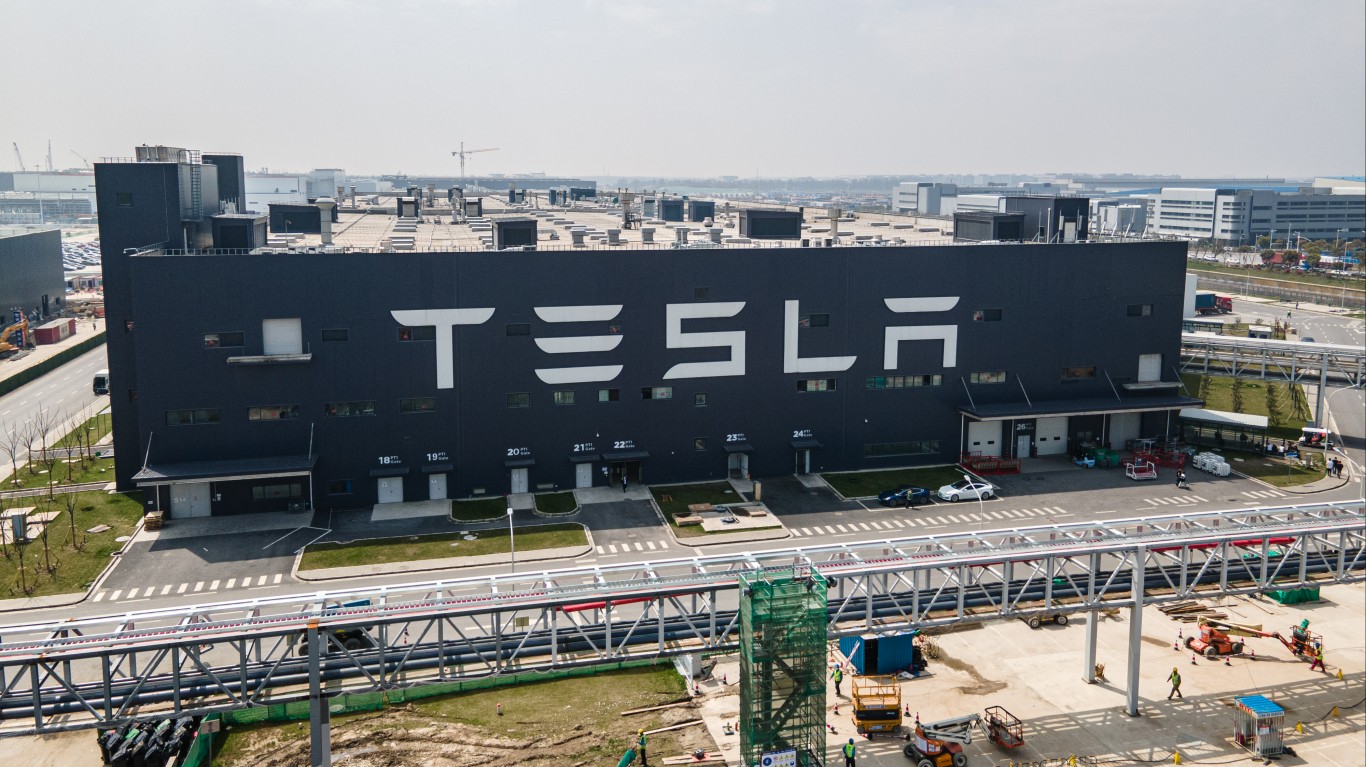
Tesla, Inc.
> 2021 revenue: $53.82 billion
> 2021 profits: $5.52 billion
> Market cap: $1.04 trillion (April 25)
> Employees: 110,000 (including energy segment, according to a Musk interview)
Once there were the Big Three auto companies – and then came Tesla and did what no one thought could be done in a traditional industrial sector: fully disrupted it. Tesla was founded in 2003 by two engineers and entrepreneurs, Martin Eberhard and Marc Tarpenning. In February 2004, Musk invested $6.3 million, according to Wired, and became the largest shareholder. He has served as CEO since 2008, taking it public in 2010. Tesla reported another record year in 2021, with revenue, profit, and vehicle deliveries soaring. Tesla delivered 936,222 cars in 2021.
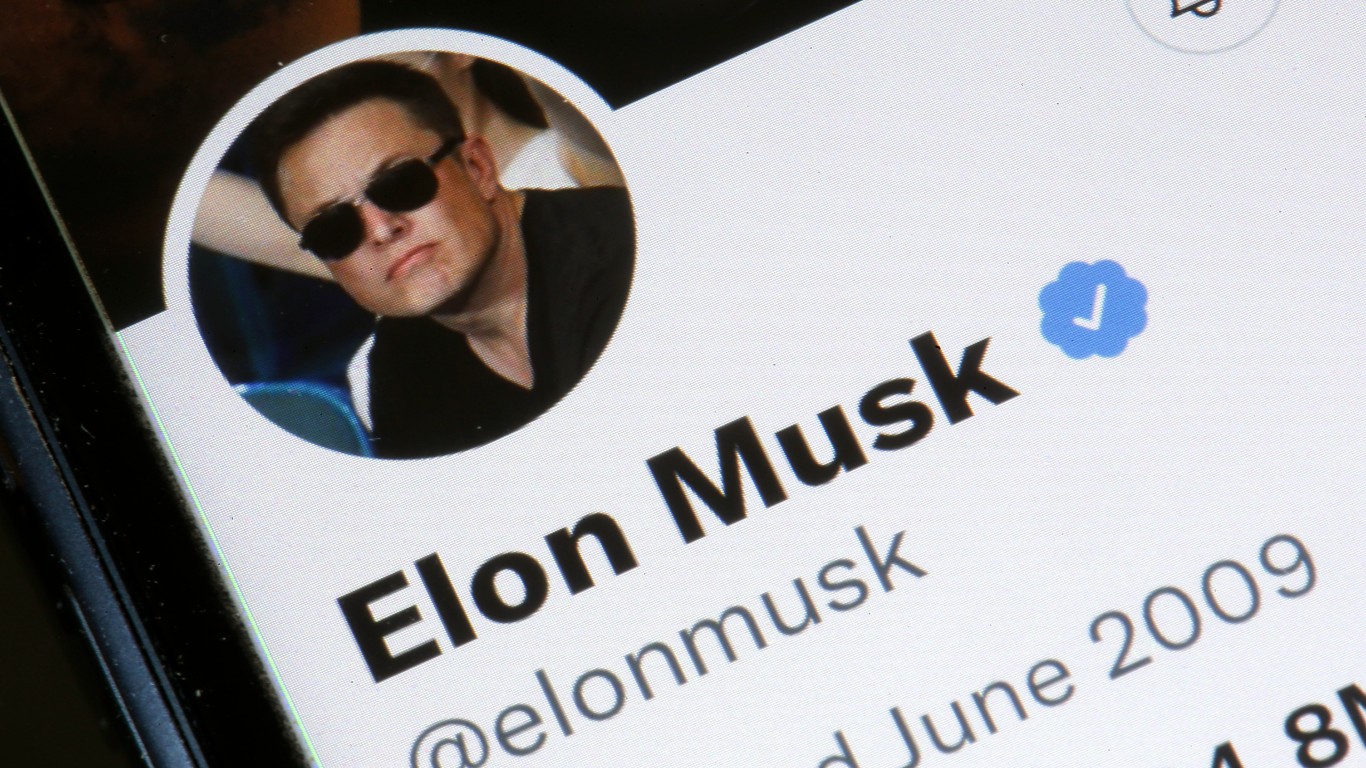
X Holdings I, II, and III
In his bid to acquire Twitter, Musk registered three companies under the name “X Holdings.” He has been a vocal critic of the social media giant, questioning its commitment to free speech. With a 9.2% stake in the company, Musk wants to take Twitter private.
According to SEC filings, X Holdings I would become the parent company if Musk completes the deal, while X Holdings II would merge with Twitter. X Holdings III would be used to help fund the transaction. Musk says he has lined up $46.5 billion in commitments to finance the deal. Investors now wonder if he will combine his other companies under X Holdings. As of Monday, Twitter has accepted Musk’s buyout bid and the deal is expected to close this year – though according to Investopedia, “it is dependent upon Twitter shareholder approval, regulatory approval, and other closing conditions.”
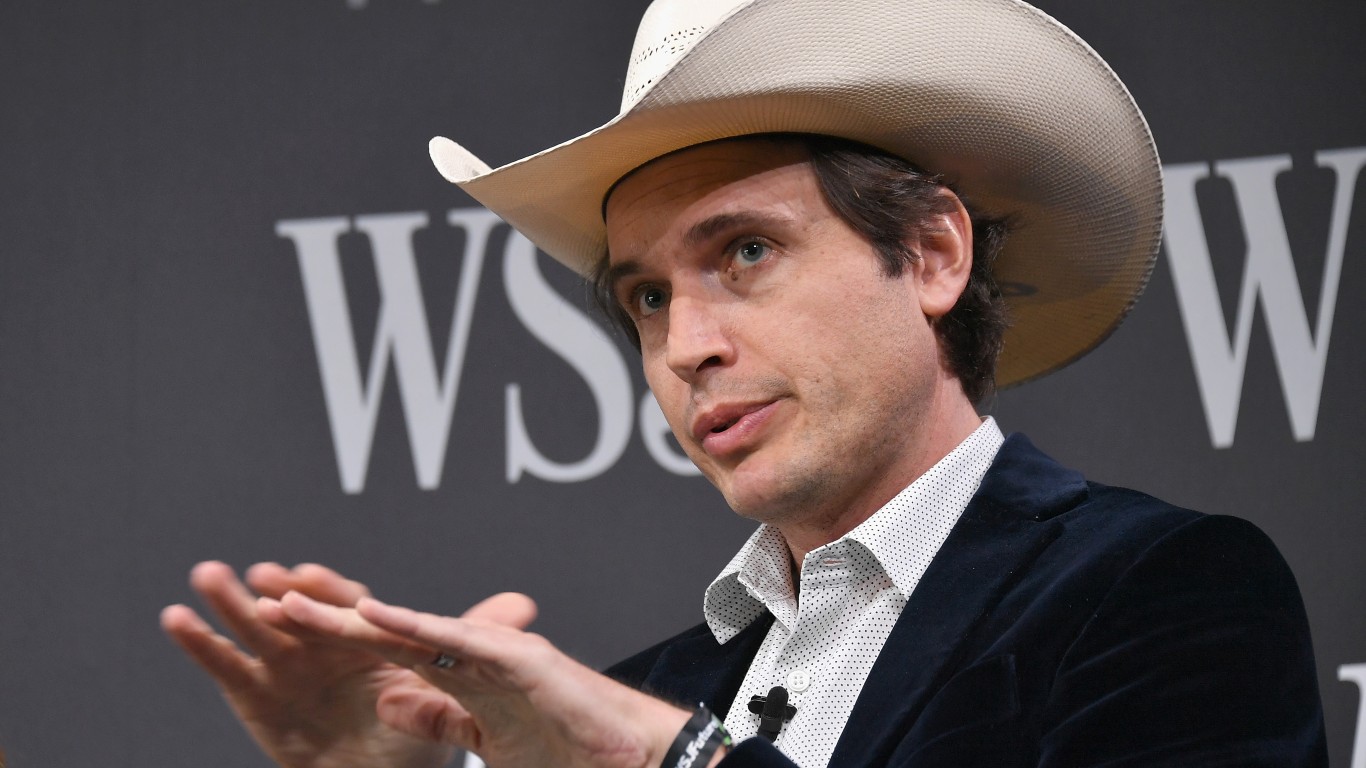
Zip2
Though long gone, Zip2 is notable for having been the first company Musk started. Musk and his brother, Kimbal, founded the company, which provided and licensed online city guide software to newspapers, in 1995. It was purchased by Compaq Computer in 1999 for about $300 million. According to Wikipedia, Musk netted $22 million from the sale and used the proceeds to start X.com, which morphed into PayPal.
The Average American Has No Idea How Much Money You Can Make Today (Sponsor)
The last few years made people forget how much banks and CD’s can pay. Meanwhile, interest rates have spiked and many can afford to pay you much more, but most are keeping yields low and hoping you won’t notice.
But there is good news. To win qualified customers, some accounts are paying almost 10x the national average! That’s an incredible way to keep your money safe and earn more at the same time. Our top pick for high yield savings accounts includes other benefits as well. You can earn up to 3.80% with a Checking & Savings Account today Sign up and get up to $300 with direct deposit. No account fees. FDIC Insured.
Click here to see how much more you could be earning on your savings today. It takes just a few minutes to open an account to make your money work for you.
Our top pick for high yield savings accounts includes other benefits as well. You can earn up to 4.00% with a Checking & Savings Account from Sofi. Sign up and get up to $300 with direct deposit. No account fees. FDIC Insured.
Thank you for reading! Have some feedback for us?
Contact the 24/7 Wall St. editorial team.
